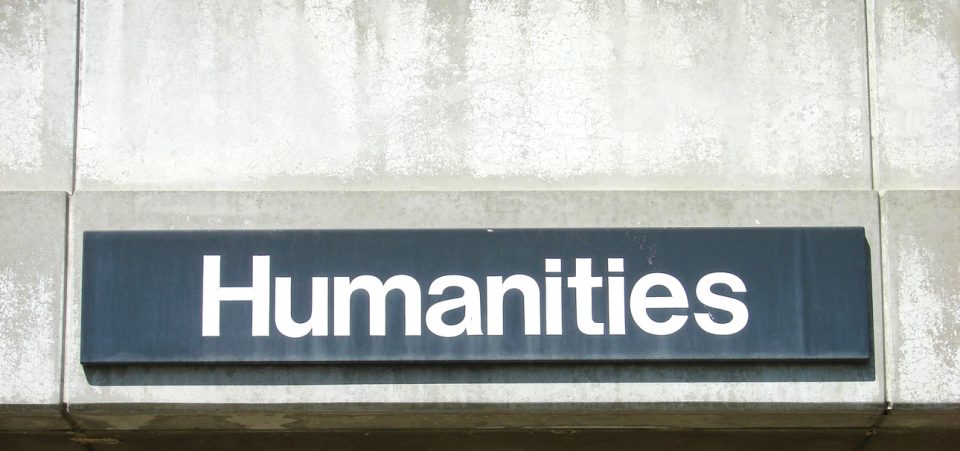If Protectionism Won’t Save the U.S. Economy, the Humanities Might
One of the major, if rarely discussed, problems facing the U.S. economy is how the United States should respond to growing international competition.
President Donald Trump thinks a return to protectionism, including tariffs, point the path to “making America great again.”
Trump has sent the first salvos of a trade war in the form of tariffs on steel and aluminum. He has aimed these against the European Union (a close ally) and China (a geopolitical rival).
But China also owns a massive amount of U.S. debt.
And rather than acknowledging the risks this represents, Trump wants to double down. He wants to enforce tariffs or duties on some $150.0 billion worth of Chinese imports. (Source: “Economists warn Trump not to make same mistakes on trade that helped spawn Great Depression,” Financial Post, May 2, 2018.)
The U.S. Economy Is Still Recovering
The U.S. economy has been growing for the past nine years.
Yes, it had to recover from a massive collapse in 2008. But growth happens to have a cyclical nature. It doesn’t care how low or how high the starting point of growth was. It does care about the probability that the U.S. economy will grow at a slower pace in 2019.
Adding protectionism to the list of obstacles that the economic cycle must endure won’t help. Protectionism will likely dampen expectations, fueling a negative psychological effect. And it will slow down investments.
It is a fact that few countries have ever managed to achieve industrialization without some form of protectionism or mercantilism. South Korea and Japan have achieved great success thanks to protectionism. They would both stop growing if they were to get rid of protectionism now.
Aluminum Duties and Their Discontents
The Trump administration, meanwhile, would like—or rather, has threatened—to impose a neo-protectionist policy, which could result in doing more harm than good.
The policy would impose 25% duties on steel imports and 10% on aluminum.
Trump has mentioned that exemptions for some countries, such as Canada, Mexico, and Australia could apply. Yet, considering the purpose of protectionism—at least in historical terms—Trump could be making a terrible mistake.
Protectionism fuels itself. That’s why whatever advantages Tump hopes to gain will be shortlived.
Perhaps the current resident of the White House does not wish to be re-elected. That possibility has to be considered, because jump-starting protectionism in the age of free trade won’t benefit the U.S. economy.
Protectionism is almost instinctual. It’s nothing more than an effort to protect the domestic industry and employees, helping them grow.
Protectionism Offers Only Short-Term Benefits
When faced with foreign competition, protection should be the last resort for long-term success.
That would be a lot like what good parents do when helping their children grow up. Governments protect affected businesses or activities by altering the prices of their foreign equivalents.
Less advanced countries after World War II, for example, would never have emerged as economic powers by the 1960s (Japan, Korea) without it.
European colonialism in the 19th century stifled the economies of the countries they occupied. They flooded them with cheaper and better-made goods, which industrialization made possible. And the locals could not compete on price.
This was a case of extreme or aggressive protectionism. The Japanese and Korean examples, which cocooned their industries with tariffs, were defensive.
But today, such development imbalances don’t exist.
The technology available to the Japanese is available to Americans and everyone else in the industrialized or post-industrialized countries. Therefore, protectionism’s advantages aren’t especially clear.
There are other ways to manage the imbalance without imposing new tariffs that would hurt American consumers and, therefore, the wider U.S economy.
The past 30 years have dismantled barriers. It would take a long period of time to restore the previous pre-globalization economic system. And it would have to involve an agreement between all players.
The way Trump wants to go about restoring tariffs would create too many shocks. And these shocks would damage the fragile post-2008 financial crisis recovery.
That’s not to say there isn’t a problem. Capitalism, or “the economy,” has been reduced to a caricature. It depicts a person willing to work for food, competing against another willing to do the same work for less food.
It’s Not Just About Labor Costs Any Longer
Is it solely a question of labor costs? No, there’s also a factor of availability of skills. Thus, the issue is about more than pure economics, or even greed.
The United States, in the case of China, should negotiate better terms within the current framework. They include seeking a wider market for U.S. goods to address China’s industrial overcapacity, and less protection for strategic sectors through various subsidies or regulations.
In other words, Trump would better serve the interests of the United States by pursuing the same policies of his predecessors.
But changes are happening so quickly that few are ready to face the challenges that the next stage of progress—for better or worse—demands.
Protectionism will only produce short-term electoral benefits, but no tangible ones in the medium or long term.
One important factor to consider is that the economy and the very nature of industrialization will inevitably change. And it’s happening faster than anyone can imagine.
The Era of Artificial Intelligence Has Begun
The U.S. economy—along with a few others—graduated long ago from achieving industrialization. The world is entering a new era.
No amount of protectionism can protect the traditional sectors that now make up the bulk of the U.S. economy.
The world economy is rapidly evolving. Artificial intelligence (AI) will gradually replace many labor tasks currently being outsourced abroad. The AI evolution (hopefully it will be a gradual process) will force changes all over the world. The U.S. economy will not be the only one affected.
The only way to thrive in the future economic landscape will be to perform the kinds of things that AI cannot. It will involve jobs or tasks requiring a combination of analysis and intuition, as well as rote skills.
A Revolution of Education
The future U.S. economy, therefore, requires a revolution in education.
For too long, business and economics departments at top universities have pushed the idea that privatization and more “technical” or “practical” education approaches were necessary. We were told that the schools should be preparing students for the workplace.
That’s a radically different purpose than education was meant to serve. The intent of education has generally been to improve the individual, who then improves society through his/her labor, ideas, and civic attitudes.
In the late 1980s and early 1990s, political and business leaders called for a radical shift in education. The idea of “learning for learning’s sake” was considered useless. It was an unaffordable luxury.
Many students decided to adjust their dreams and focus on finance- and business-related post-graduate education. MBA degrees became the sine qua non, the essential tool to gain access to the best jobs.
In 2008, there was a potential existential crisis. Many thought, as in 1929, that the crash would fuel a renaissance for the traditional professions from engineering to teaching and humanities. But the MBA’s currency went even higher.
This is one of the lesser-discussed problems of the modern U.S. economy (and actually the global one).
The MBA degree demand was not fueled by the need to manage actual businesses on Main Street. (Source: “Want to Kill Your Economy? Have MBA Programs Churn out Takers Not Makers,” Evonomics, last accessed May 3, 2018.)
The original purpose behind the MBA was to train already experienced business leaders and managers to perfect their skills and deal with challenges of growth. The original MBA students were creators.
Today, MBAs are trained largely in finance. They manage the creative economics of Wall Street. They are takers, not creators. They suck the energy out of the economy rather than contribute to its growth.
The students learn to read profit and loss statements at an advanced level. They don’t, however, learn to think critically, to analyze, and to understand how to approach complex problems from a philosophical—ethical, if you will—point of view. (Source: Ibid.)
And it is precisely in the area of ethics, critical thinking, and complex multidimensional problem-solving that humans will be most needed as AI takes over a wide range of tasks.
Modern finance or economics, loaded with pseudo-scientific jargon and more mathematics than the Apollo program, have reduced the ability of students to approach problems.
The appeal of wealth in modern society is unparalleled. CEOs and billionaires are household names. Some are veritable pop culture heroes, if they can project an image of “planet saving” with their monetary grandeur.
A Return to Humanities and Critical Thinking
In the fast-approaching future, an MBA will become useless in advancing the U.S. economy. Technical tasks will be increasingly performed by non-humans. This will generate a number of unprecedented problems, which society will struggle to understand and process.
Indeed, the careers of the future, the ones that will contribute to managing the forthcoming AI society, will involve philosophy and other humanities. Ethics, sociology, and anthropology will be more necessary than ever.
Forbes has even suggested instituting a new corporate role: the Chief Philosophy Officer. (Source: “Why Your Board Needs A Chief Philosophy Officer,” Forbes, March 9, 2018.)
The U.S. economy, if it is to thrive in the next few decades, needs to rediscover a pioneering spirit. It must be able to confront difficult problems with multi-ended outcomes.
The AI robots and computers will crunch the numbers. The humans will have to be able to pursue the quest for meaning. The better that Americans can adapt to this new reality, the better the U.S. economy will adapt.
By the way, controversial though he may be, one of the top financial successes of our time, George Soros, is a graduate of philosophy.






